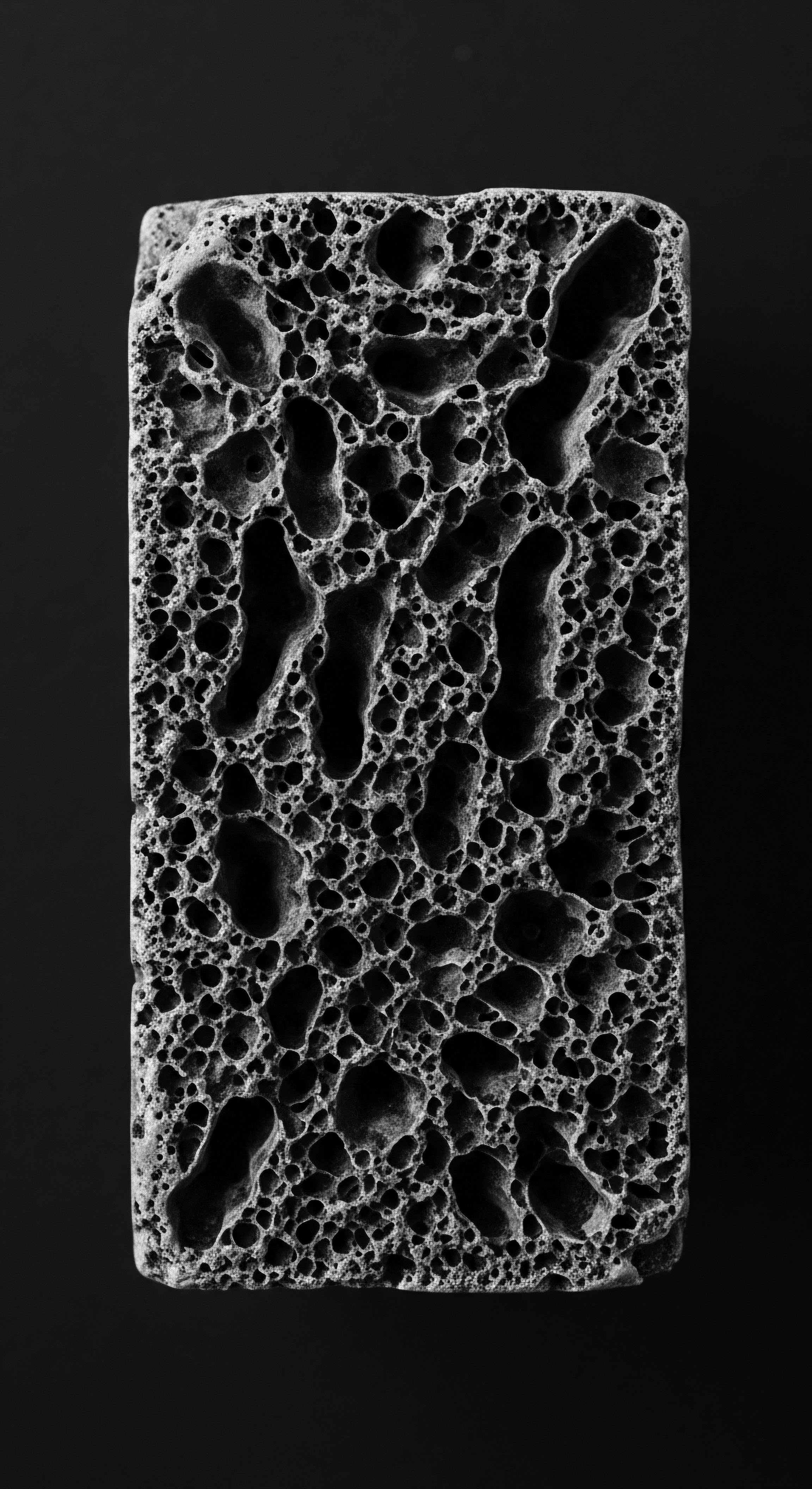
Fundamentals
The concept of Ethical Ingredient Supply, when viewed through the lens of textured hair heritage, delineates a commitment extending far beyond modern industry standards. It represents a profound reconnection to ancestral practices, understanding that every botanical extract, every oil, every natural element used in hair care carries a story of origin, cultivation, and stewardship. At its simplest interpretation, Ethical Ingredient Supply means ensuring that components procured for hair products are obtained in ways that honor the planet, uplift communities, and respect the intricate web of life that sustains us all. This dedication involves a deep regard for the individuals who cultivate and gather these ingredients, guaranteeing fair recompense for their labor and wisdom.
A foundational understanding of Ethical Ingredient Supply begins with recognizing its dual impact: on the natural environment and on human dignity. Sourcing with conscience means minimizing ecological disruption, preserving biodiversity, and ensuring that agricultural methods are sustainable for future generations. Simultaneously, it compels a rigorous examination of social equity throughout the supply chain. Are cultivators receiving just compensation for their efforts?
Are working conditions safe and respectful? Are indigenous communities, whose knowledge often underpins the efficacy of these ingredients, acknowledged and fairly treated? These questions form the bedrock of ethical procurement, aligning contemporary commerce with timeless values of reciprocity and integrity.
Ethical Ingredient Supply for textured hair means honoring the planet and people in every step of a product’s creation.

Echoes of Ancient Practices
Long before the term “Ethical Ingredient Supply” entered modern discourse, ancestral communities practiced a form of it intuitively. Their reverence for the earth and its bounty was woven into daily life and hair rituals. They understood the seasonal rhythms of plants, harvested with respect, and shared knowledge across generations about the properties of natural elements. This wisdom, passed through oral tradition and lived experience, ensured a sustainable relationship with their environment.
Ancient hair care practices, from the application of potent botanical oils to the use of mineral-rich clays, were often deeply localized. This localized sourcing minimized transportation impact and fostered a direct connection between the user and the origin of their hair provisions.
- Shea Butter ❉ West African communities have for centuries relied on shea butter, extracted from the nuts of the shea tree, for its deeply moisturizing and protective properties for skin and hair. The gathering and processing of shea nuts has historically been a communal undertaking, largely carried out by women, forming a vital part of local economies.
- Coconut Oil ❉ In many tropical regions, coconut oil has been a staple for hair health, valued for its ability to penetrate the hair shaft, reducing protein loss and providing deep moisturization. Its traditional use reflects a deep understanding of botanical efficacy, often sourced directly from local groves.
- Aloe Vera ❉ Revered across various ancient cultures, including parts of Africa, for its soothing and hydrating qualities, aloe vera was a common ingredient in hair remedies. Its widespread use in traditional care speaks to its accessibility and gentle yet potent effects.
The ancient wisdom underscores a simple, yet profound principle: the earth provides, and in return, humanity offers care and respect. This fundamental interaction laid the groundwork for what modern ethical sourcing aims to recreate and formalize. Traditional societies, living in close communion with nature, understood that their well-being, including the vitality of their hair, was intrinsically linked to the health of their environment.

Intermediate
Moving beyond the foundational definition, an intermediate understanding of Ethical Ingredient Supply for textured hair reveals its multilayered complexities, particularly in bridging historical traditions with contemporary global markets. This deeper examination recognizes that true ethical sourcing extends beyond avoiding explicit harm; it actively seeks to generate positive social and environmental impact. It compels producers and consumers to consider not only the purity of an ingredient but also the fairness of its journey from the earth to the product, and ultimately, to the individual.
At this level, the concept of Ethical Ingredient Supply becomes less about a static list of ‘good’ ingredients and more about the dynamic systems that bring them forth. It accounts for sustainable harvesting methods, ensuring that natural resources are not depleted but rather replenished for future generations. This consideration holds particular weight for ingredients traditionally harvested in biodiverse regions, where ecological balance is delicate.
It also addresses the economic fairness for those involved in the early stages of the supply chain, often smallholder farmers or communal gatherers. The principle of equitable compensation, alongside safe and dignified working conditions, is a cornerstone of ethical practice.
Ethical Ingredient Supply moves beyond simple harm avoidance, embracing active contributions to environmental health and community upliftment.

Bridging Ancestral Wisdom and Modern Markets
Ancestral practices for hair care, deeply rooted in specific ecological contexts, offered inherently ethical models of supply. Communities carefully cultivated or gathered plants, understood their life cycles, and processed them with minimal intervention. This approach fostered a reciprocal relationship with the land. Today, as global demand for these traditional ingredients escalates, the challenge involves scaling supply without compromising the integrity of these ancient ways.
It demands transparency, allowing consumers to trace an ingredient’s path from its origin to their hands. It also requires safeguarding indigenous knowledge, ensuring that traditional practices are respected and that the communities who developed them receive appropriate benefit and recognition.
For communities with a rich heritage of hair care, like many within the African diaspora, the preservation of traditional practices is paramount. The global interest in natural ingredients, often those with centuries of use in these communities, presents both opportunities and potential pitfalls. Opportunities arise for economic empowerment through fair trade, allowing communities to benefit directly from their traditional knowledge and resources.
Conversely, pitfalls include the risk of exploitation, cultural appropriation, or unsustainable harvesting when demand outstrips respectful cultivation. Navigating these complexities requires a thoughtful approach, one that prioritizes the longevity of both the natural resource and the cultural practices surrounding it.
The beauty industry, increasingly, is recognizing the imperative of this balanced approach. A consumer survey indicates that 88 percent of global consumers prioritize purchases from companies with ethical sourcing commitments. This statistic underscores a growing global awareness and a desire for products that align with personal values. Companies embracing ethical sourcing often partner directly with local communities, fostering long-term relationships that support both ecological and social well-being.
The connection between historical practices and contemporary ethical sourcing highlights an enduring concern for the well-being of hair, the earth, and its people. This shared ethos creates a vital bridge, inviting us to acknowledge the legacy that underpins the very concept of conscientious beauty.

Academic
The academic understanding of Ethical Ingredient Supply for textured hair delves into the complex interplay of socio-economic systems, ecological imperatives, and the historical marginalization of Black and mixed-race communities. This rigorous definition posits that Ethical Ingredient Supply transcends mere compliance with regulatory standards. It embodies a commitment to reparative justice, advocating for practices that counteract historical inequities in global supply chains and acknowledge the profound contributions of ancestral knowledge systems. It necessitates a critical examination of power dynamics, ensuring that communities historically disenfranchised from their own resources are now empowered beneficiaries.
This level of insight requires a thorough investigation into traceability, not just for quality assurance, but as a mechanism for accountability to source communities. It evaluates the efficacy of certifications ❉ like Fair Trade or organic ❉ in genuinely benefiting local producers and ecosystems, moving beyond superficial marketing claims. Furthermore, it incorporates principles of circularity and regenerative design, recognizing that sustainable sourcing is not a destination but a continuous process of ecological restoration and community reinvestment. An expert perspective on Ethical Ingredient Supply demands an interdisciplinary approach, drawing from ethnobotany, environmental science, socio-economic studies, and critical race theory to construct a truly holistic and equitable framework.

Deep Roots: The Basara Arab Women of Chad and Chebe Powder
The traditional practices of the Basara Arab women of Chad offer a compelling historical example of an inherently ethical ingredient supply system, predating modern conceptualizations. For centuries, these women have relied on Chebe powder , a unique blend of local herbs and seeds, to maintain their exceptionally long, strong, and healthy hair. This practice is not merely a cosmetic routine; it is deeply interwoven with their cultural identity, social structure, and intergenerational knowledge transfer. The ingredients for Chebe powder are sourced directly from plants thriving in their arid region, reflecting a profound understanding of their local ecosystem and its botanical offerings.
The sourcing and preparation of Chebe powder traditionally occurs within a communal framework. Women gather the raw materials, often sharing the labor and the resulting blend. This collective approach ensured the sustainability of the resource, as depletion would directly impact their community’s ability to maintain their cherished hair traditions. The process itself is a ritualistic one, often shared among women, strengthening social bonds and transmitting ancestral wisdom about plant properties, preparation techniques, and the cultural significance of hair.
In this context, “ethical” was not a certification applied externally but an intrinsic value embedded in their relationship with nature and each other. Their reliance on locally available, natural components, coupled with communal processing and direct benefit to the users, epitomizes a localized, self-sustaining model of ingredient supply.
The Basara Arab women’s use of Chebe powder offers a living testament to ethical sourcing as an ancient, communal practice.
A significant challenge in the contemporary landscape arises as Chebe powder gains global recognition. Its rise in popularity has unfortunately led to a surge in demand, sometimes resulting in unverified sourcing practices that undermine the very principles embodied by the Basara women’s traditions. Unscrupulous actors may harvest ingredients unsustainably, offer unfair compensation to local gatherers, or even misrepresent the authenticity of the powder, severing the link to its original cultural context and ethical underpinnings.
This external commercialization threatens to disrupt a centuries-old, intrinsically ethical system, highlighting the urgent need for stringent ethical frameworks in a globalized market. The commercialization of traditional ingredients without proper respect for their origins can lead to the exploitation of both natural resources and the cultural heritage of indigenous communities.
This situation underscores why a robust definition of Ethical Ingredient Supply must include provisions for cultural intellectual property and equitable benefit-sharing. It requires a system where the communities who developed these practices are not merely suppliers but acknowledged partners, benefiting directly from the global interest in their ancestral wisdom. When companies collaborate directly with local and indigenous communities, it helps preserve ancestral knowledge and promotes economic empowerment, ensuring authentic and respectful sourcing.

Interconnected Dimensions of Ethical Procurement
The academic lens on Ethical Ingredient Supply integrates several critical dimensions, forming a comprehensive framework for responsible action.
- Resource Conservation and Biodiversity ❉ This facet involves rigorous ecological assessment of ingredient origins. It requires understanding the natural habitats of plants and ensuring that harvesting does not compromise local biodiversity or lead to species depletion. This often means supporting cultivation over wild harvesting where appropriate, or implementing strict rotation and regeneration protocols for wild-gathered elements. For instance, the sustainable collection of traditional African ingredients like baobab, mafura, and mongongo oils is vital for ecological balance and local communities.
- Social Equity and Labor Justice ❉ Beyond fair wages, this dimension delves into empowering marginalized communities. It demands transparency in labor practices, ensuring safe working environments, prohibiting child labor, and upholding the rights of all workers. For textured hair care ingredients often sourced from regions with complex socio-economic histories, such as various parts of Africa, addressing legacies of colonial exploitation and systemic inequality is paramount. Supporting women’s cooperatives, like those involved in shea butter production, directly contributes to economic empowerment and strengthens community structures.
- Cultural Preservation and Intellectual Property ❉ This dimension acknowledges that much of the knowledge regarding natural ingredients’ properties and uses originates from indigenous and traditional communities. Ethical sourcing here means obtaining Free, Prior, and Informed Consent (FPIC) from these communities when utilizing their traditional knowledge. It involves establishing transparent agreements for benefit-sharing, ensuring that communities receive a portion of the profits derived from their heritage. This prevents cultural appropriation and fosters a respectful partnership.
- Traceability and Transparency ❉ A truly ethical supply chain offers complete visibility from source to consumer. This means detailed documentation of where and how ingredients are procured, processed, and transported. This level of transparency builds consumer trust and allows for accountability, particularly when dealing with complex global networks. It shifts the burden of proof to the supplier, ensuring they uphold stated ethical commitments.
The historical trajectory of hair care in Black and mixed-race communities, particularly since periods of forced migration and colonialism, reveals a profound resilience in adapting and preserving traditional practices despite disruptions to their ancestral ingredient supply lines. Consider the resourcefulness required to maintain hair health and styles using newly available or cultivated materials, which in itself was an act of cultural preservation. Madam C.J.
Walker, a pioneering figure in African American hair care, developed products often using ingredients like petroleum jelly and coconut oil, adapting her formulations to meet the specific needs of textured hair when traditional African ingredients were largely inaccessible due to forced displacement. Her work, while a response to a different era, ultimately created a pathway for Black women to find employment and cultivate pride in their hair and heritage.
The ongoing movement towards natural hair care, which has gained significant momentum globally, is not merely a trend; it represents a deep, collective yearning to reconnect with ancestral wisdom and authentic practices. This movement highlights the enduring legacy of traditional ingredients, often drawing renewed attention to plants and remedies that have nourished Black and mixed-race hair for generations. The increased demand, if managed conscientiously, can be a vehicle for positive change, driving investment into ethical sourcing initiatives that genuinely uplift communities and safeguard the ecological foundations of these cherished ingredients.

Reflection on the Heritage of Ethical Ingredient Supply
As we reflect upon the journey of Ethical Ingredient Supply through the vibrant tapestry of textured hair heritage, a profound understanding emerges: this is not a concept born of recent corporate social responsibility movements. It is an enduring echo of ancestral wisdom, a continuous whisper from generations who understood the intimate reciprocity between humanity and the earth. From the skilled hands gathering shea nuts in West African plains to the meticulous care given to Chebe plants by Basara Arab women, a legacy of mindful procurement was always present, deeply interwoven with cultural identity and communal well-being.
The evolution of ethical sourcing in the modern age, while necessary to address globalized supply chains and complex economic forces, essentially seeks to formalize and safeguard the very principles that our forebears practiced intuitively. It is an invitation to listen to the whispers of the past, acknowledging that the vitality of our hair, deeply connected to our lineage and self-expression, draws its strength from the integrity of its source. To choose ethically sourced components for our hair is to honor the hands that tended the earth, the knowledge passed down through generations, and the spirit of resilience that defines textured hair traditions. This choice connects us to a larger narrative of care, a continuous thread that binds ancient wisdom to contemporary consciousness.
The journey of a strand, from its elemental biology to its profound cultural significance, is a testament to an unbroken lineage. It reminds us that our hair, whether coiled, kinky, or wavy, carries memories not only of personal experience but also of collective history and ancestral strength. By aligning our choices with the principles of Ethical Ingredient Supply, we do more than simply cleanse or condition; we participate in a living ritual of respect, sustainability, and profound connection to the sources that nourish our hair, body, and soul.

References
- AbF9wXHgufe2m7vELiFIzmwJxy0XX73EHZJfX8WwXRl1Kk4bAGevty9WoBvolGDc1EMV_CGiJUz0H5FarozoDa_lDTB9CMuyvW45lI9rWQJGkKlFG8rPJmA1x7mi5gcpY7qFc6JdCWjF0UCWfq-yM-NHxu1qOtyrDe1E-8nNS-sl01umpYXYeiUxoU03m_Ok
- AbF9wXEiZjeMHT_DX6BXpkMs9S8iOC-0EiFHjDP9LRy_AlAmovnwhBPef0lGFZP218f4Tpa-xNXELs4dprSFwu1a9xlIV-sEr6yDrOYxnNisiEAaw3E6d94Hdb-Ab3WKZb8TdFFEyBUx5YH_zHaDgucUgXArG9-Pz1I=
- AbF9wXFQ-6XCtXeJ8jG6QCm9H1T-cNdXwhEuhMNBx3WcrS20LI_2UydqxILZgTVfGgvqQvKuaLa0sTPHxF0sTnlPeJK2kBbSUznLIZOorAhClN0uviH8omNHjwGaHmT_LiHydWOvg7JrkIfEG8DTj-5QW_5u9xM_LMF5hhCX7Ix43Hoi_GuWl13bJdHRVw7lRVGKwKTx7DJN3oAtzXFVQCjPlb3VvXnbK3RAK4Y=
- AbF9wXFQV6KxlSw3LnfUt-DLGNtaI-pZLgaAZxmxzcduDt6g737HJXzRId9RPELX1TaXT49N4geQ5t01d-GxgufKmiwPJ_39mpXnHCaDlWNi3KS84JikfRMowSe7W-osjwC3JB-ztL51mx1VLrX67349zZaPn03bCPz_mCvYUR5tgrZV08FI0_Lc7qV5lg==
- AbF9wXGF1EzBdMR6_8HaYDciRhC2rnivFSipMu3HyUC0RWtlSe0kWwM9sk2mreuHIvhHEB2kEk9NTVmbpVa2oeReWAJwvA5i-w5PoObftT5OBXXVdExenKNJdhci3O4q00nBfE62cvVmK8WZENCJugoywR2CybRZUF83iWFNQHSE4DXqzF1DZxA_Xd9CFOEk4PX2o-HWed_sb_NHmuhf_f2dlePNJLaQ2A_Bkyn1J4-tZYHnn_OFVjU=
- AbF9wXEm2OGhUoQFyKBsDKN7yW-04fwA0bivLJ6Hi3I-l4xjph1_tkkh4zm7U2xh191wShkcLbVRCYrD3zFzN5FV5ayCyJwySHO1vmN1PtCCPP8AQnLYnYoh2nB8VmOOhGUXPMp2_sne_yV4bMdqJrQRYs7DqPn6Ml7kE6T06GXEg1X-MMb1DA5Qp6bsmDLbv-o=
- AbF9wXEJV4h9DFISKQW7Ei7uqmkySoaIK7JpiwWmBFRxjZK9p8QNLFwRLS9q5396qBlcxj9k56mpW1aen_ETMemsxukLLta7fr289c9o0iFdJ6UrMjbb0yCHZBobTWabiut9SIiVTKF53UrsK3V1fjMYd7EiNMgKvK19RjdePR5k6cyQWToiFEYZJvDshGOHjAGUbFzGK94uSTKD0yqNlZp5XVH9G4_nqegUGceWwaGheN4fiA==
- AbF9wXHQqTngfLNlPiRNKTH6HUM2nlJ0mJzGoUds2j0ddVwftq3vlFu560tNkZLm6ZHFlZnhVAg2dt4TCwd06HAgHq0wRtx7VAnjlgZEIxy2b4N-2-0rMPCLA3XUPiJFa8IS1nxL8gzPIpsWNpP_XRDAdOL93QGBusZ2EPJmy494kZbdt1RPDdbPCk_42AfD-D5WVyEAnDODET5GRciXkg==
- AbF9wXFIwpxo_q8yWJ0SuiED5evKovR6cqAr2vCWYy56sFa-9aIm3c–EgN4RAUg_d7JW2rNReqHDliweFO4EST5tHC6zNkp79_bjpYH2QyGUfw-iw_LT3rquwYHk4vzdENM10yJlYxK9PQXBa9NxtnkohcQL9bEXGRBv7YoPHIXitYzSsJI0Se2szEmW3-XFUYkAX2mc3IR0gt6GTtkBmqQTa4E42Jb
- AbF9wXGKTE7UnTh83CPdoGaP9Sh-pznudva3IkCEtiThv227IuvxlEuuCHvkBb2gzCzM6QZn_5Wu4n1AgVKS6a_trvZx8biP0qiFfHiErwfQjMkAR5AOWXqwBoq7pQXtKY0=
- AbF9wXEkbogVWwo0bdF2WhwSPdVTtLTIhFGlrP2KtN3D2rZL0ODdsP0wJwwHhmDfnSpP-RZ94JV4zsv90j9iKV4-8Y1zKUJYZG-ueu-yk-IM0G5TMZUGfu7tI226pW_BtOBTYwEJpGoVH2ffcDibFGZH2erhLt3CaLDF6DUR-dowVDxJkctFI0YjGnIGnc_xwjm0gRArqhn7uro1wi4i96vmfEuQ2hMsmIBDlpdT-cLYqlUSByhjfaS68OnW8o9328326C0W6uHm
- AbF9wXF361ky7QPtJpLGpWz9V-eIukwtsafiahfIRAe_sG3j6LhYhjYeAJ_qtghXF48_w7_ZJJ_-G32MnT2a5_JRTjRAklBFEuclAerZdpu84Lf5_incBhxike72FkUC6qlgFSsRHHR7Ui2QGr6-CTrf0vCsZNHwHqQfMpY85E0GFG5HbH49Xlhs
- AbF9wXEDJFRBt6L4iI_1CCR-Oi1YTYnd_tkZtloCfwK5tAEMMRTFi6NStd_bLGNKQ4AQdCS42kNiYgqlrNoxBL-Bqjf9rwiXDktpPl3yBReNHAAWF56TtB_6HJGgXYFiyQoaeHwjyHbx6tNn5E5P
- AbF9wXEJVrUy2PseXK3zvR0xPz_d9P3p0HbPXG5pnvkUXfw-reklfHMtEdXpQu-fp4kdDFBBMp2JLRMFTbHVMtACasJsh3hmLZx-PvsZi5rMqFFZUqYTA1sA-2PFMUBl0nZLiw0z
- AbF9wXGLMhl4z5xx18VF0hEuXrSrbJ6ASvZwnBJ1CePUt6y7eaiwWAg07v7P1wQ9qTHbSoQ3X4q_oqKHO_dn8QIXjDlhUkN8-8r3jZoVjlPm2Vo_yKBeFdfvzwa-IQq6lLq2ufCb8uX_NH6aTYw0Nj2YDBu4q48COVr6viQvaV3umjEIK3XP74yFktJz5awvvrmvYNJDyZS7lu4a8mScWEoSuuLq5ofqubD8i28W92daSBBY5mtp6DJC
- AbF9wXE63ta0cA8m1BFo9GDLZlPnOJ7V9KVnB48u8ursk3mevta1HDC0cy4gxC8Kln9u9bBa3l1Ucs1qqWgGcyv81LEHabRmypm1YpqSd6PTb54VPTvCGUzlwSPt1dNGAiVeErF-z7Hdny5hKknkvOFIHob7LPVPD05CgHiAACUnCuuITWULlES13EYRR4bk3hvUN6KhN_Rngc-UWGd2wvGpp3W2SZmw8j18_3vmYCk=
- AbF9wXHfQ3w_Y5KTqFI7LuRiCY-tB3HK0fSyuyk9tJiziiF1RPYgYwXPLXCVGFAnVOYbY5xRgVqp41VL3-86MwMXqFjd5aCC7LZTdv223W8c7Dig-1Q4p4u9Taclok-ImbFB5t_kay9AhtAnNIHu2tJP2A==
- AbF9wXGQSrMkAfWjRYFvFgnZIBb3P7_J94K-ozQwpSqFcl6f4sbvXBLHhtUdfuUiWyisqp9gylbhvi3nJjL0HLISB02lP1n1nRtiH4ii0rrFVegcpqOnytEoviGMRvK7kHprHK7gkqJLWKtJ
- AbF9wXH4uFEwMkLLwv1cfJzn4tb6DUDCyw0z-XKGq1WhJwDzKepz_cvGvxo_C5-LUBgYzbi9aHKmKsjn3iPeIf7lAVVD2IQI16dZd3uDAn_kNbxsWMY2Yww2skTy0Rt3_eewVlu6pmNDxdbpcVhw60-hOLjS1KwcKkj28MiVMwaDj-i5CnerBNyXe1Tk39NXtTGjfa26mK_iHvMxVgPPuA==
- AbF9wXG2QIt_Ot50kieArsOe5J-UlI-urQybEjbI58lvJeukohViHDW9J2XnAwdyrgTxfBxq08LZ0FgTqGEKZcE-Cu6xDgdBz5e1I3F2OqzlATfufjOnZSQFFYbLfMCzVGzpoa3_SssMSoHZ3qOfjSZqI9BfK-124SKwoNf0c8DnHGe7D94kOr-jWRNcHd_mzB5xmHcBdr6wzpidYUoH4zoMldyBgl_kng==
- AbF9wXFKgfy3u0_0Sg34tDoCg6ubIr3Y-Tps6POHB-3DyMr-iMFpqVnXT5mrhzMdBihfXFTW9fO13P2kqp1FtZ10aX1i2yTW2gVb_vl9BofcE4jFeNKVYxSncea9MCCuw8SwIVAmqmS-n3ku3MyctZBEO9eMrGD6BEX03-OSxw==
- AbF9wXHiPTEUIVuNxPGBGShwZjGspCCOvoxx2VY6j3jbgHy_nkbnjkACGF-KsT2yD_85G4FyoNKXzOCARDXqv6l0P7DnmmNZamMSwJ2r8APnEH0Y4Re8ZB4kmOggpqm3DBAqgTpmwIsY
- AbF9wXFriFxt7xCkWyRwnmRNDfUpWObrkBJyAsCpxcmo0-pPgK4m74RfGopEPO10xKUo7wo8y2Mv_gM-CzhjkmRW7cH2egaI_3YlCk461TGgRqkPZgK2b8jpb0cFdv_NnusOvj7j4mYX98DSEswx4xWNJUhTw-J8IGa9NtdqJzcqbaabes_0k49bxM=
- AbF9wXGkrVaYjSi5Tc7eah1B_8Oz67zzwooliq2yp3uSwqBST_17iOvLwUU5xbs1ziy9BgUTB_SwMyZbqad-lKJ49OAPe0SfuGuNKyt1TBXt2A_PZ7NmeWmCSWZlro40o5x8XkFarXYxAw5zznDGRUCHLEpHC9nh9ny6hS6dUPCjm3Tz0cRvDLK-CGc15-tQ__rhrpoNlozc1PKjItpYvW2F1G0oWHvFC9paLQ==
- AbF9wXFcrHl-NMdWVn6oXQNcLCNr72c3cqRHxyNi38DXANUqziHq6ka-2xxt9YvjDDFu59D8SvgD5x_mo7RTLgRc6mI7S2qSOAg_iDBzf5mWJm_2NXygoqOFz8UTwZf5JsI219OtVIqzWgtqhud2-Uks5OCmh5euuBKWJ0WHk4O2xg==
- AbF9wXGf3PhsPSu8Oj5emkZWLkft8oP7IAQ1i5TU-XVDUD3lA7DG1fTjwy35__1F7fZh_iSV4UdIrsqqxwTvsf1Dapx392ewKBp3-ypwVyc3zOo3LRYKKacFHZ5VQAaalhgl5SChOTaOPifTDJdutU-jQKXrAqoT
- AbF9wXFqWFW-QAUlAiaccG31WgVdTRcxPxqiKadx4c6T7TCSQXoWfJ5gJGgEiv3Y4XyLNtbRooVOgAqOLKpnz6nXXrS9pXUGqAseTcI_Dl9qX8RZGudon8TApwLxC-S5LBSWF20dsqOPUROHV1hfRRx9xUg8RcNk7BfmXKLUXQG0Ks-IpgBPDES9HlOR-ISWDTaHoY86HDSSDcWYOMesvf3LVKo=
- AbF9wXH0DwUzV_laUQr-6mDbVJp3nxHTdP-UT5FJtZyj5fiSsCzGtMZWu1EQ3xDPxB5Z7TRbAPzWUTfbSde-AeC59x_MXhLcfsfbcz8WsmDLQX9LhmZ-OPuiIYWRA7_rabAZrzRWK8Z4FE3Eg_xC67VqdQqYFKJRC54aqrFRoh-D
- AbF9wXEKTs4AbVcrIj_ITLv4cnKbFGWoKnQ7l_17xMZ55DxIU9u4klLCkK0G8tjho9tCcSoui5Lqoq56sgUSVzghX0N9Wq5tWnuvnIIvlASgoJG4q3LmWC7ps3GZM4M9sGr6CY_ifEhrefqN8HpjJxl-vg==
- AbF9wXG3JjXSuYPL0OyrsMqz7uu4QFYmCCH1siL5stvi5Ul1gULNqnJc5SNdkzR7CRiEc9DWOFsTviHr9pSD5Hlx_aal2ndveS5QHQfSguygOmDMppNVs52JBYWXYA93LgYqld79





